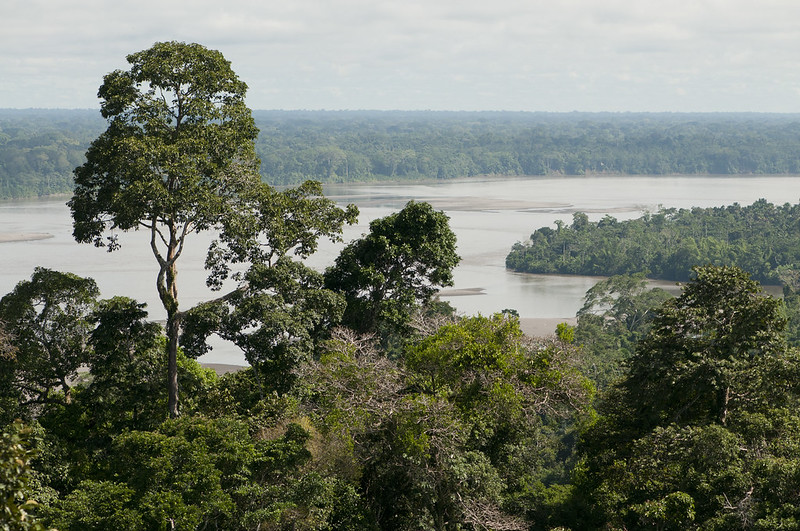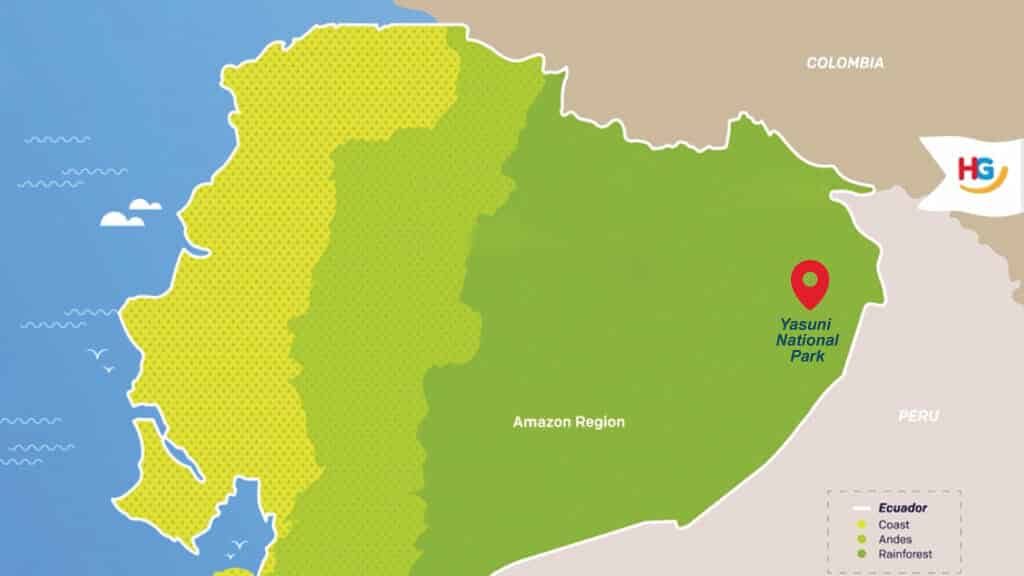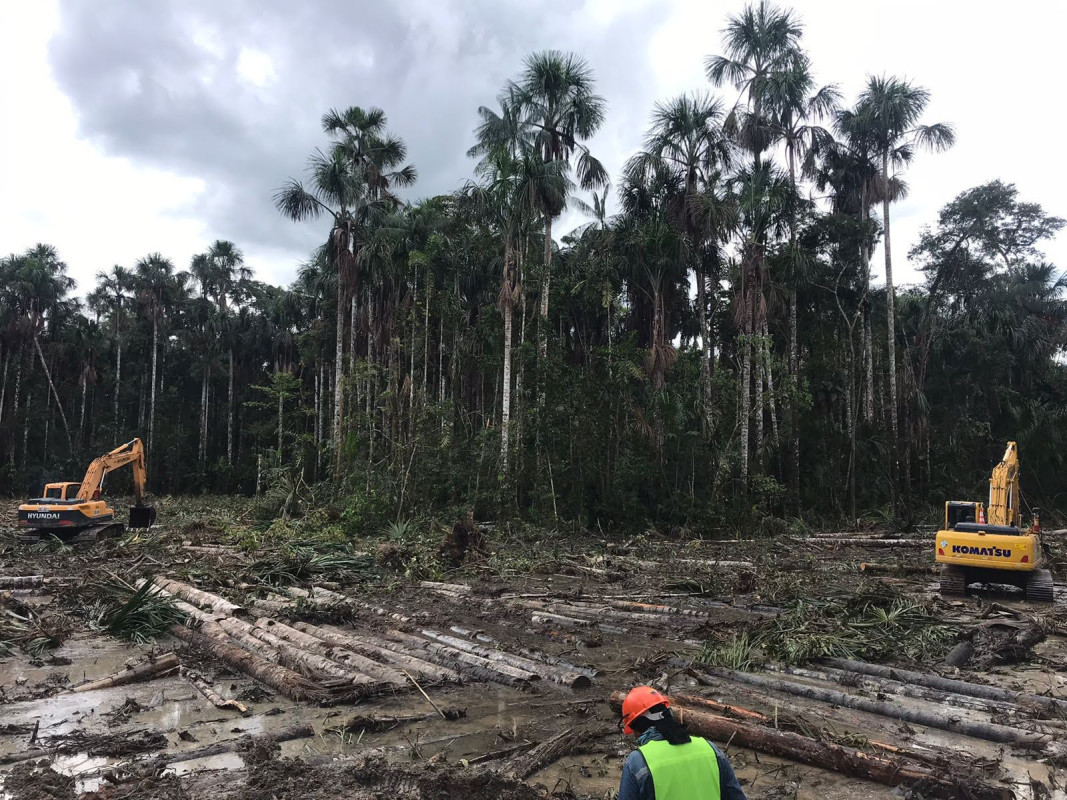 Last month, Ecuador voted to ban oil drilling in the Yasuní National Park.
Last month, Ecuador voted to ban oil drilling in the Yasuní National Park.
With almost 59% voting in favor, the ban will permanently cease drilling in the Ishpingo-Tambococha-Tiputini (ITT) oil project. Known as Block 43, the project is located on the east side of the park.
Tucked away in the Amazon rainforest, the park is home to astonishing biodiversity. However, oil drilling has threatened the hundreds of unique species and the Indigenous peoples who live alongside them.
The referendum is a resounding win for climate and indigenous activists. Yasunidos, a grassroots environmental collective, has been at the forefront of pushing for the vote. Now, Ecuador’s government is pledging to honor the vote’s results.
Let’s take a closer look at why Yasuní National Park is worth protecting, and what the referendum results mean for climate action and Ecuador’s future.
Yasuní National Park: An Oasis on the Brink
 Yasuní National Park spans 2.5 million acres (1 million hectares) of land and is home to a staggering variety of flora and fauna. In 1989, it was designated as a World Biosphere Reserve by UNESCO, the United Nations Educational, Scientific, and Cultural Organization.
Yasuní National Park spans 2.5 million acres (1 million hectares) of land and is home to a staggering variety of flora and fauna. In 1989, it was designated as a World Biosphere Reserve by UNESCO, the United Nations Educational, Scientific, and Cultural Organization.
Did you know that over 610 bird species, 139 amphibian species, and 121 reptile species have been identified in the park? A number of Indigenous peoples also live in the park. The Tagaeri and Taromenani live in complete isolation, a way of life that has become increasingly vulnerable.
The park sits on massive oil reserves, which the government views as the ticket to lifting Ecuador’s economy. In just the past 15 years, Ecuador has drilled over 4000 oil wells across 68% of the Amazon. This is roughly equivalent to five oil wells drilled every week!
Hundreds of pipelines export oil from the rainforest. The two largest bring oil to the Pacific Coast: the Trans-Ecuadorian Oil Pipeline System (Spanish acronym SOTE) and a heavy crude pipeline owned by private oil companies. The third pipeline, the Poliducto Shushufindi-Quito, transports other forms of fuel to Ecuador’s capital, Quito.
 Risks Of Drilling
Risks Of Drilling
But if Ecuador has such an extensive network of pipelines and oil wells, why isn’t the country receiving record profits?
First, the region is highly unstable geographically. Volcanic eruptions, earthquakes, landslides, and flash floods are common in the Andes. This poses serious risks to oil pipelines constructed in the area. Since the SOTE was completed in 1973, it ruptured 47 times by 2003. Meanwhile, private companies in charge of the pipelines have employed unethical methods of waste disposal. Between 1971 and 1993, about 714 million barrels of oil and toxic wastewater have been dumped into the surrounding rainforest.
In April 2020, three pipelines, two of which were major, ruptured. The resulting oil spill released close to 16,000 barrels of crude oil into the Amazon. This caused untold devastation to local biodiversity and Indigenous peoples, many of whom are still suffering from its effects today. In the long term, such toxic chemicals disrupt the local ecosystem and make Indigenous peoples vulnerable to life-threatening cancers. What’s more, the 2020 spill is but one of the more visible disasters. Most oil spills in the Amazon go unreported.
New Hope for Yasuní
 Ecuador’s politics have been volatile, with the assassination of presidential candidate Fernando Villavicencio sending shockwaves through the country.
Ecuador’s politics have been volatile, with the assassination of presidential candidate Fernando Villavicencio sending shockwaves through the country.
However, the determination of Ecuadorian voters is inspiring. Yasunidos’ victory at the polls reflects changing attitudes in Ecuador. A younger generation is gaining greater awareness of climate issues and is willing to hold government officials accountable.
Besides the Yasuní referendum, Quito residents voted decisively against gold mining in the Chocó Andino, a fragile highland region. A stunning 68% voted in favor of the mining ban.
The ban is a blow to Ecuador’s fragile economy, likely to cost hundreds of millions in the long term. On the flip side, activists cite the long-term, irreversible damage of oil drilling to the country’s vibrant ecosystems and suggest investments into more productive fields such as eco-tourism.
Sources: CNN, Guardian, Reuters, Al Jazeera, AmazonFrontLines.org







